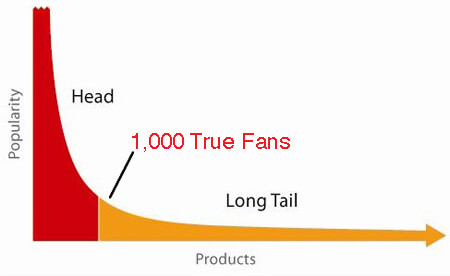The idea of “1000 true fans” — first proposed by Kevin Kelly in 2008 and later updated for Tools of Titans — argued that to be a successful creator, you don’t need millions of customers or clients, but need only thousands of true fans. Such a true, diehard fan “will buy anything you produce”, and as such, creators can make a living from them as long as they: (1) create enough each year to earn profit from each fan, plus it’s easier and better to give existing fans more; (2) have a direct relationship with those fans, which the internet (and long tail) now make possible.
But patronage models have been around forever; what’s new there? How has the web evolved; and how are media, and audiences/voices finding and subscribing to each other changing as a result? If the 1000-true-fans concept is also more broadly “useful to anyone making things, or making things happen” — then what nuances do people often miss about it? For instance: That there are also regular fans in the next concentric circle around true fans, and that the most obscure node is only one click away from the most popular node.
Finally — when you combine this big idea with another idea Kelly proposed in his most recent book The Inevitable (covered previously on this episode) on inverting attention economies so audiences monetize their attention vs. the other way around, how do we connect the dots between them and some novel thought experiments? In this hallway-style episode of the a16z Podcast, which Sonal Chokshi recorded with Kevin in our pop-up podcast booth at our most recent a16z Summit, we discuss all this and more. Because on average, we all currently surrender our attention (whether to TV, books, or whatever) for about $3 an hour. Whoa?!
image: whatleydude/Flickr
More About The a16z Podcast
The a16z Show discusses the most important ideas within technology with the people building it. Each episode aims to put listeners ahead of the curve, covering topics like AI, energy, genomics, space, and more.



